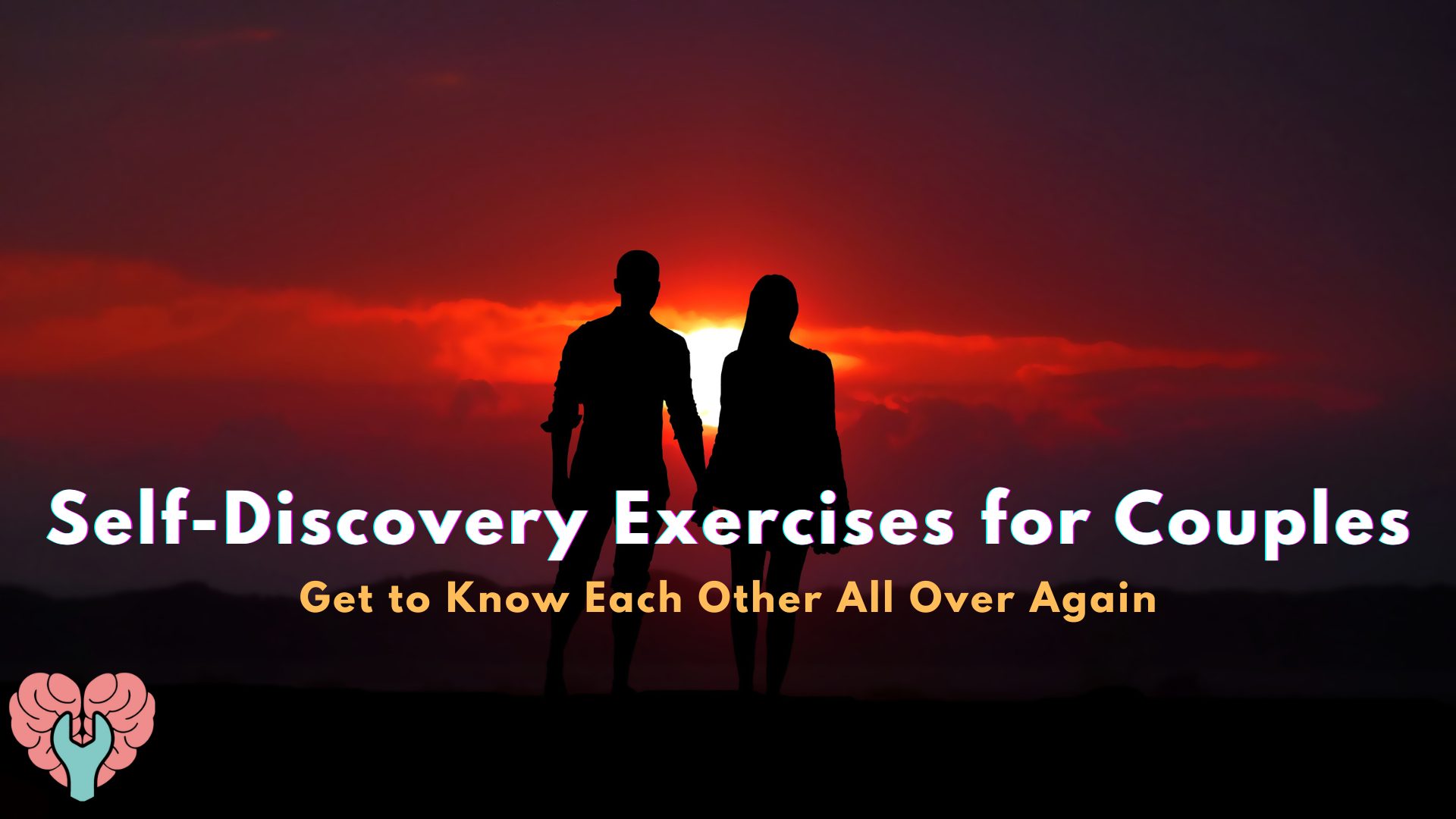Relationship 101: Self-Discovery Exercises for Couples
Relationship 101: Self-Discovery Exercises for Couples

Written by Jenefa Anthony KB 11780
Relationships can start off feeling electric as everything’s new, exciting, and full of possibilities. However, after a while, even the most loving couples can find themselves on autopilot, drifting into routines and losing the sense of curiosity that initially brought them together.
That’s where self-discovery exercises come in, not just for the individual, but for the couple. When you learn more about yourself and your partner, you deepen your connection, improve communication, and rebuild intimacy. And no, this doesn’t mean sitting in a circle with strangers or spilling your secrets to a counsellor (unless you want to). These are simple, effective ways to check in with each other as well as yourself.
Let’s look at some relationship 101s (practical exercises) that help couples reconnect by rediscovering who they are.
Reminder: If you or your loved ones are struggling with relationship or mental health issues, please don't hesitate to reach out to us at Soul Mechanics KD or Soul Mechanics Ipoh. Remember, seeking help is not a sign of weakness but strength!
1. The “Who Am I, Really?” Journaling Swap
According to Pennebaker & Seagal (1999), expressive writing can clarify thoughts, regulate emotions, and even boost immune function. When shared in a relationship, it can also increase empathy and trust.
Why it works: Most couples stop learning about each other once the “honeymoon phase” fades. But people change. And when partners stop sharing those inner shifts, they grow apart. Journaling brings that inner world to the surface.
The Relationship 101 exercise:
· Each partner spends 20 minutes journaling about three questions:
1) Who am I right now, not who I was when we met?
2) What matters most to me these days?
3) What’s something I’m afraid to say out loud?
· Then, swap journals and read in silence. No talking until both are done.
· Afterwards, reflect together, not to judge or fix, but to understand.
2. The “Values Alignment” Map
Research from motivational psychologist Shalom Schwartz (2012) shows that shared values between partners predict long-term compatibility more than shared interests. However, value misalignment, if not understood, can lead to chronic frustration.
Why it works: Long-term satisfaction doesn’t come from surface compatibility (same hobbies or music taste). It also comes from shared values – what you believe really matters in life.
The Relationship 101 exercise:
· Each partner writes down their top 5 core values (e.g., honesty, creativity, family, freedom, ambition).
· Then, compare your lists. Look for overlap, but more importantly, look for differences.
· Discuss: How do these values show up in your day-to-day life? Are you living by them? How do you support (or clash with) each other’s values?
3. The “Ideal Day” Thought Experiment
Positive psychology research (Seligman & Csikszentmihalyi, 2000) shows that imagining and articulating positive future experiences also boosts well-being and can bring couples closer by building shared dreams.
Why it works: Fantasies and preferences reveal parts of us we don’t always express. Describing an “ideal day” pulls back the curtain on what brings real joy, comfort, and peace.
The Relationship 101 exercise:
· Imagine it’s a day just for you. No responsibilities, no interruptions. What would your perfect day look like, hour by hour?
· Write it out or say it out loud to your partner.
· Switch roles and listen carefully. Don’t interrupt or try to improve the other’s fantasy.
· Afterwards, reflect: What surprised you? What does it reveal about your partner’s needs or stressors?
4. The “Emotional Check-In” Ritual
Emotionally focused therapy (EFT), developed by Sue Johnson (2008), emphasizes the power of emotional attunement. When partners regularly tune in to each other’s emotional state, they build “safe bonds” that buffer against stress and conflict.
Why it works: Emotional neglect doesn’t always look dramatic, but it’s often quiet, subtle, and cumulative. Over time, couples stop asking: How are you really? Emotional check-ins keep the inner world on the radar.
The Relationship 101 exercise:
· Once a week, sit down together without phones or any other distractions.
· Each partner answers questions like:
1) What’s something that’s been weighing on me this week?
2) What’s something that made me feel connected to you?
3) What’s one emotional need I have right now?
· Just listen. Don’t rush to fix anything. You’re showing up to understand, not solve.
Reminder: If you or your loved ones are struggling with relationship or mental health issues, please don't hesitate to reach out to us at Soul Mechanics KD or Soul Mechanics Ipoh. Remember, seeking help is not a sign of weakness but strength!
5. The “Conflict Playback” Exercise
According to Gottman Institute research (Gottman & Silver, 1999), successful couples repair after conflict by identifying underlying emotions, not just surface complaints. Understanding these patterns helps reduce defensiveness and resentment.
Why it works: Arguments are inevitable. But how couples process them makes all the difference. This exercise isn’t about revisiting fights, but rather, learning from them.
The Relationship 101 exercise:
· Choose a recent disagreement, not a warzone, just something that left you both rattled.
· Replay it as if you’re describing a scene in a play. Be objective: what happened, what was said, how did it escalate?
· Each partner identifies: What was I really feeling underneath my reaction? What did I need at that moment but didn’t ask for?
6. The “Questions Game” Deep Dive
Why it works: Familiarity can make couples think they know everything about each other. But we’re all changing, and we all have unspoken layers. The right questions can unlock them.
The Relationship 101 exercise:
· Take turns asking each other questions. Use a deck like The And or We’re Not Really Strangers, or look up the “36 Questions That Lead to Love” from Aron et al. (1997).
· Set a rule: no short answers. Explain, elaborate, reflect.
· Pause after each response to ask: Why is that meaningful to you?
Aron’s original study showed that deep, vulnerable conversations can accelerate closeness even between strangers. For couples, it reignites curiosity and connection.
7. The “Timeline of Us” Drawing Exercise
Why it works: Reflecting on shared history strengthens relationship identity, a sense that “we’ve been through this together.”
The Relationship 101 exercise:
· On a large sheet of paper, draw a timeline from when you met to now.
· Mark major moments: firsts, struggles, turning points, triumphs.
· Take turns talking through each one: How did we grow? What changed? What did I learn about you?
Narrative psychology (McAdams, 2001) highlights the role of life stories in shaping our identity. When couples co-author a shared narrative, they build resilience and closeness.
Why These Exercises Matter?
These aren’t just games or bonding activities. They’re tools that tap into deeper psychological principles:
· Curiosity keeps love alive. When we stop being curious about our partner, we start to drift. Rediscovery fuels desire, compassion, and commitment.
· Self-awareness leads to better communication. When you understand yourself, you can express your needs more clearly and hear your partner’s more accurately.
· Shared meaning or value is stronger than shared interests. Doing the same activities doesn’t guarantee a connection. Building meaning together does.
Reminder: If you or your loved ones are struggling with relationship or mental health issues, please don't hesitate to reach out to us at Soul Mechanics KD or Soul Mechanics Ipoh. Remember, seeking help is not a sign of weakness but strength!
Final Thoughts
Relationships thrive when both partners stay awake to who they are and who they’re becoming. Self-discovery is never a one-time event; it’s a lifelong process. But when couples choose to do it together, they don’t just avoid drifting apart, but they grow closer in deeper, more authentic ways.
Relationship 101 doesn't need a conflict to look at. In fact, the best time to reconnect is before disconnection begins. Make it a habit—a ritual. A check-in with the person who once fascinated you and still can.
If you’re looking for a therapist in Kota Damansara or Ipoh area, you can click here for more information.
If you enjoyed reading this, why not broaden the horizon of knowledge by learning about "Relationship 101: Mistakes That Kill a Relationship"? You can read the blog here.
For more content related to mental health do follow us on our official Instagram.

